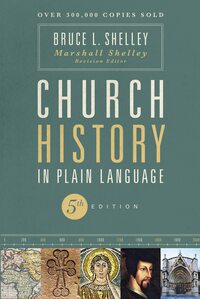You need to sign in or sign up before continuing.
Take a photo of a barcode or cover
hopeful
informative
reflective
slow-paced
informative
inspiring
medium-paced
For what this book was, there was nothing wrong with it. I guess I just thought I was more interested in church history (after studying chapters 2-3 of Revelation) than I really was.
Good, thorough, bite size chapters outlining church history. This may not have been the most in-depth church history book I've read, but it was the easiest.
hopeful
informative
slow-paced
challenging
informative
inspiring
slow-paced
This is the most readable of all the church history books i've examined. It is thorough and often gives unique insights. It is a relatively easy read as history books go and the accounts will hold your interest. I would recommend this book as a great starting place for a layman wanting to study church history and it has enough depth to still be of value for those conversant in church history.
challenging
hopeful
informative
inspiring
fast-paced
Shelley can't decide if he wants to be a churchman or an historian so he flounders between both, following the path of least resistance.
He's typically unhelpful, especially in areas of blatant wrongdoing (his defense of the crusades is shady at best, his understanding of mass conversions is shockingly un-evangelical, etc.)
For a Protestant, he seems terrified to take stances that could challenge Roman Catholic consensus (including in instances of morally dubious popes).
When he arrives at the modern era, he finds the courage to condemn communism, sing the praises of unbridled capitalism (and John D. Rockefeller?), and America in general.
He spends moments on important movements not engaging with common objections or obvious debates. He includes the most famous thing Luther never said ("Here I stand..."). It's a statement any layman with a modicum of research can find is a clear fabrication. He quotes it without any qualification, even in the form of a footnote.
I read the book with two friends (one with a master's in History, one that's a history buff, I have a bachelor's). They pointed out questionable statements as their areas of expertise intersected with chapter topic. We were disappointed throughout the text.
He's typically unhelpful, especially in areas of blatant wrongdoing (his defense of the crusades is shady at best, his understanding of mass conversions is shockingly un-evangelical, etc.)
For a Protestant, he seems terrified to take stances that could challenge Roman Catholic consensus (including in instances of morally dubious popes).
When he arrives at the modern era, he finds the courage to condemn communism, sing the praises of unbridled capitalism (and John D. Rockefeller?), and America in general.
He spends moments on important movements not engaging with common objections or obvious debates. He includes the most famous thing Luther never said ("Here I stand..."). It's a statement any layman with a modicum of research can find is a clear fabrication. He quotes it without any qualification, even in the form of a footnote.
I read the book with two friends (one with a master's in History, one that's a history buff, I have a bachelor's). They pointed out questionable statements as their areas of expertise intersected with chapter topic. We were disappointed throughout the text.





